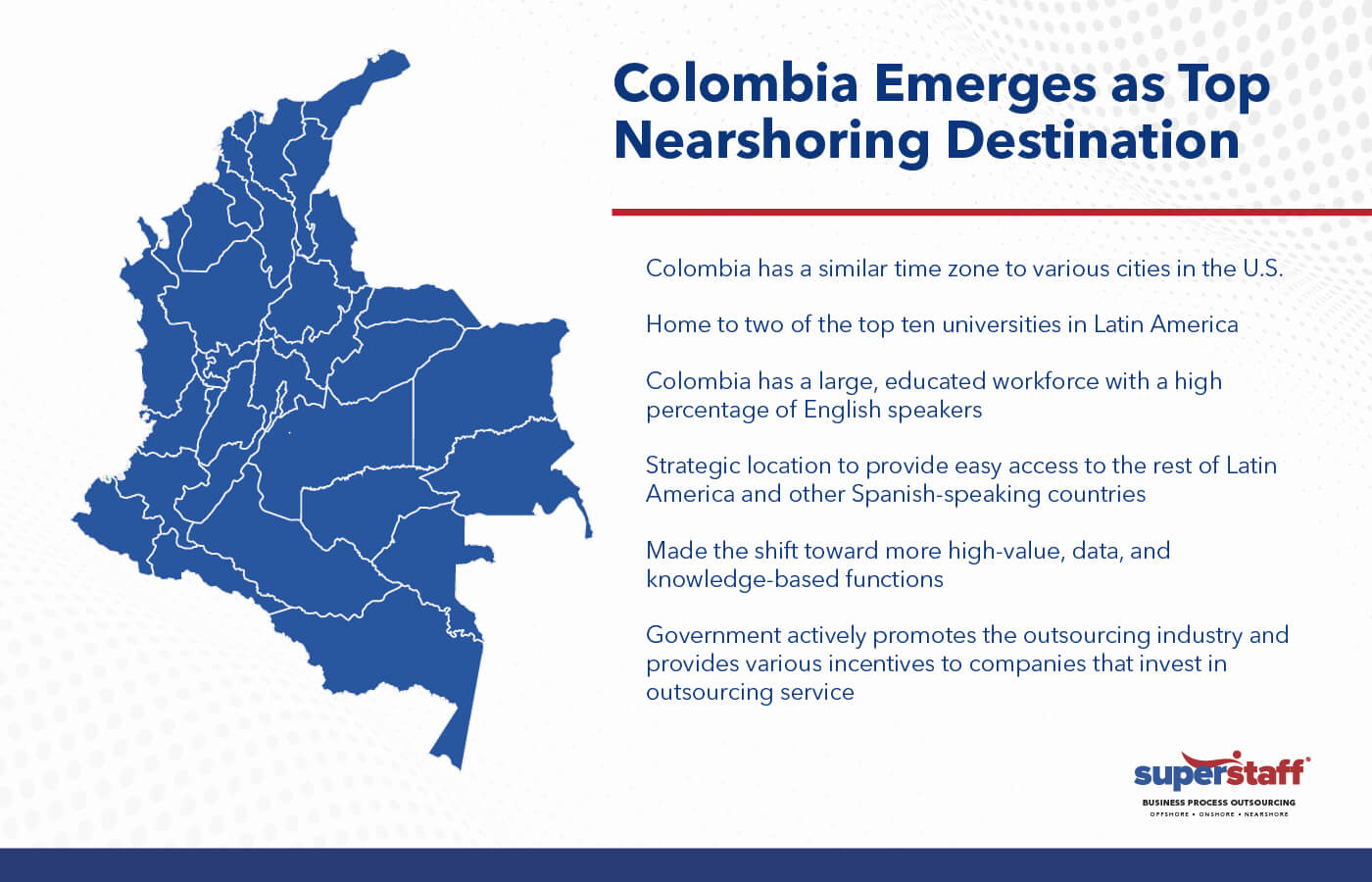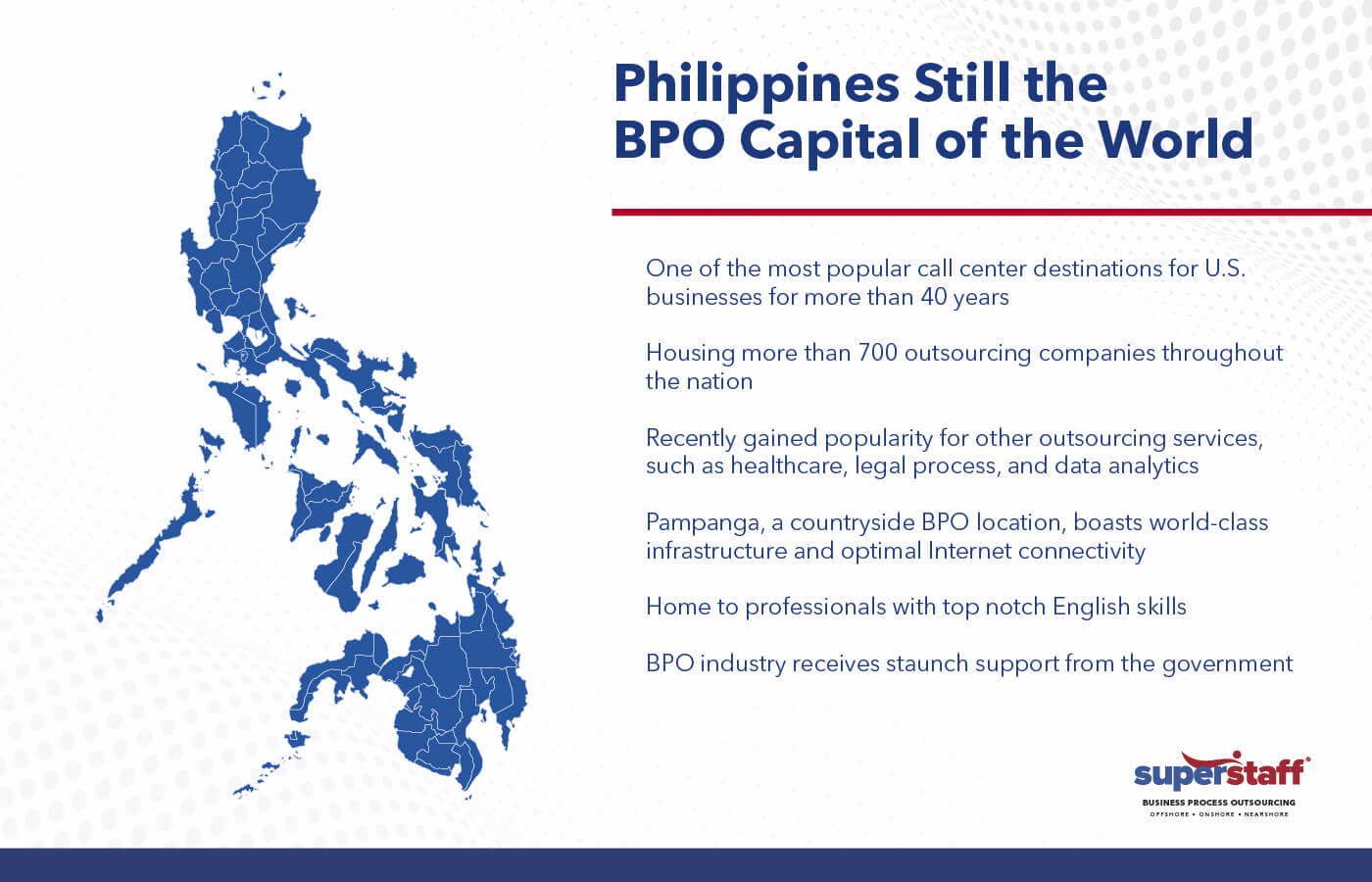
With a limited pool of onshore workers, many U.S. companies are reaping the benefits of outsourcing functions to nearshore or offshore providers. Outsourcing allows countless companies to access a global talent pool, improve the productivity and efficiency of their operations, and save costs simultaneously.
If you’re reading this, you may already be familiar with the advantages of having an outsourced team beyond your borders. Compared to delegating tasks to BPOs within the same country, working with offshoring and nearshoring providers can offer greater cost reduction while keeping up work quality and performance.
However, you may not realize that choosing the right outsourcing model, whether nearshoring or offshoring, can be critical to the success of your business.
This article will look closely at offshoring vs. nearshoring — what each concept means, their advantages and disadvantages, and how you can find your ideal BPO partner. Then, we’ll help you better understand how to choose which solution works best for you!
What Is Nearshoring?
Nearshoring refers to delegating a company’s operations to a business process outsourcing (BPO) provider in a nearby country. A nearshore destination must be close to the country where the business is located and typically works in similar time zones.
For instance, North American businesses may outsource to nearshoring companies in countries such as Colombia, Mexico, or Brazil. Western European companies may outsource to neighboring countries in Eastern Europe, such as Poland or Ukraine.
Benefits of Nearshoring
Many U.S. companies utilize nearshoring to their advantage, working with nearby countries that provide high-quality services at lower rates. One example is the e-commerce giant Amazon which has reported nearshoring its engineering, back-office functions, and I.T. support to BPOs in Costa Rica. Another example is Uber’s popular ride-sharing app, which outsources its call center operations to Jamaica.
So, what makes nearshoring so attractive to these powerhouse companies? Here are a few reasons:
- Ease of Communication
Compared to other outsourcing solutions, one of the most significant advantages of nearshoring is that many American businesses find it easier to communicate with nearshore teams.
Latin American nations have a strong bilingual or English-speaking population, so U.S. businesses don’t have to worry about hiring translators because they often speak the same language. In contrast, communicating with an offshore team can be more challenging because of linguistic differences, leading to possible misunderstandings in the workplace.
- Greater Cultural Compatibility
Compared to countries that are geographically farther away, nearby countries are more likely to have similar cultures and traditions. As such, nearshore BPOs won’t have much trouble understanding the cultural nuances and preferences of their target market, fostering more seamless and effective communication between the two countries. - Time Zone Alignment
Many businesses opt for nearshoring because they want to partner with a BPO within the same time zone. Having a closely aligned time zone allows for easier collaboration and communication with a remote team, particularly when it comes to time-sensitive projects and tasks.
When needed, clients can even take a quick, short flight to visit their chosen BPO’s country without much hassle and with fewer travel costs.
Where to Find Your Ideal Nearshore Outsourcing Partner

Many possible nearshoring providers exist for North American businesses, including Mexico, Jamaica, Costa Rica, and other Latin American countries. However, one emerging nearshore outsourcing destination that’s worth highlighting and taking into consideration is Colombia.
Located in the northwestern part of South America, Colombia has a similar time zone to various cities in the U.S., making it an ideal nearshoring location for many American businesses. Given the slight time difference, managing projects and scheduling meetings with a Colombian BPO team is a breeze, allowing for quick and easy teamwork and collaboration.
In addition, Colombia is home to two of the top ten universities in Latin America, so you can gain access to a wealth of skilled labor. Although American companies once focused on “blue-collar” work, such as manufacturing, when outsourcing services in Colombia, there has been a shift toward more high-value, data, and knowledge-based functions in recent years.
What Is Offshoring?
Offshoring is when companies hire a BPO provider located overseas, typically a geographically distant country that may not share the same culture or time zone as the organization’s location, to handle part of or all of their processes. A few examples of functions that companies may outsource to offshore teams include software development, back-office support, customer service, and more.
Read More: Top 5 Ways Offshore Outsourcing Solutions Empower Both Startups and Forbes-Ranked Businesses
Benefits of Offshoring
The truth is that many companies, no matter their size or sector, utilize offshoring to their advantage, including industry giants like Google, Facebook, and American Express. Here are just a few reasons why this outsourcing solution has become a widespread and popular option:
-
Flexible and Scalable Services
Delegating tasks to offshore BPOs enables businesses to expand their workforce quickly and cost-effectively. As consumer demand fluctuates, companies can also upgrade or downsize their outsourcing capabilities without disrupting their core operations.
-
Large Talent Pool
Nearshoring limits your hiring search to countries close to your borders. In contrast, offshoring lets you dip into the much larger global talent pool. When you’re having difficulty securing workers for specialized functions like data science or software outsourcing, this can be a significant advantage.
-
Cost-Effectiveness
The greatest advantage offshoring provides businesses is the significant cost savings. Among different outsourcing solutions, it is often considered the most economical and cost-effective option. Research studies have found that U.S. companies save up to 40 to 60% on operating and labor costs simply by outsourcing to the Philippines.
Where to Find Your Ideal Offshoring Partner

American businesses can outsource services to different countries, from India to China to Eastern Europe, depending on their particular needs. However, one offshoring destination has consistently remained a top choice for many U.S. businesses, and that country is the Philippines.
Recognized globally as “the BPO capital of the world,” the Philippines has been one of the most popular call center destinations for U.S. businesses for more than 40 years. Housing more than 700 outsourcing companies throughout the nation, this Southeast Asian country has recently gained popularity for other outsourcing services, such as healthcare, legal process, and data analytics.
Businesses often station their operations in Makati, the long-established business district and financial center of the Philippines. The city is home to multiple multinational corporations, banks, IT-BPO headquarters, and other commercial enterprises. However, more and more organizations are reaping the benefits of outsourcing outside the country’s capital.
One local BPO destination gaining traction is Pampanga, a countryside location boasting world-class infrastructure and optimal Internet connectivity. Considered a strategic location, Pampanga offers convenient access to the NCR and other northern regions. The local government is hoping to shape the province into the nation’s economic and technology hub, focusing development particularly on highly populated areas like Angeles City and Clark.
During the COVID-19 pandemic and the subsequent “Great Resignation” movement, where American companies experienced mass resignations and labor shortages, offshore outsourcing in the Philippines made a world of difference. Delegating tasks to offshore BPOs allowed U.S. B2Bs to ease the burden from their existing employees without affecting their operations.
Offshoring vs. Nearshoring: Which Should You Choose For Your Business Operations?
Now that you understand the difference between nearshoring and offshoring, it’s time to ask this question: which should you choose? The answer will depend on several factors, such as your business format and goals. Here are a few things to consider when deciding on your ideal outsourcing solution:
Collaboration and Control
If collaboration between teams is necessary for your line of work, nearshoring may be the more appropriate model. It can help you foster more seamless collaboration and let you exert greater control because you’ll be working within the same or similar time zones.
When working with an offshoring provider, having to schedule meetings can be difficult because of the vastly different time zones.
During urgent, time-sensitive projects where every team member needs to be on the same page, managing an offshore team can present an array of challenges.
However, for industries that have a more hands-off approach, offshoring can be a strategic option. Without needing to communicate in real time, you can have peace of mind knowing that your offshore BPO partner is getting work done as you rest.
One example is in the e-commerce sector. If your online business operates 24/7 and serves customers all over the world, having an offshore customer service team can be ideal. Since you operate on different time zones, your CS team can make sure buyers can reach your brand, no matter the time of day.
Language and Culture
Many U.S. businesses choose nearshore outsourcing because Latin American countries have similar cultures to the U.S., and most understand English. As such, it is easier for them to understand cultural nuances and contexts, allowing them to swiftly adapt to their client and target market’s needs and preferences.
On the other hand, offshoring may benefit American companies differently. Since offshore BPOs typically come from countries with vastly different cultures to the U.S., partnering allows for diverse thoughts, perspectives, and opinions.
Working with an offshore team lets U.S. B2Bs better understand cultural differences. If the company wishes to enter a new market, the offshore BPO can help them achieve more excellent localization of products and services.
Read more: 10 Reasons Why US Companies Outsource Customer Service to the Philippines
FAQ: Your Quick Guide to the Best Outsourcing Models For Your Business
- What is offshoring?
Offshoring is the process of delegating tasks to a third-party company based in a faraway country. For example, a U.S. enterprise can outsource software development professionals in the Philippines. - What is nearshoring?
Nearshoring is when companies outsource work to BPO providers based in neighboring countries. For example, instead of investing in an in-house team, an American business can outsource technical support to Colombia. - Offshoring vs. nearshoring: which business practice is better for IT companies?
Technology is a highly specialized field requiring niche skills and knowledge, so many businesses struggle to build a qualified local team. As the U.S. tech industry deals with widespread talent shortages, outsourcing development to offshore and nearshore providers has become a popular solution.
If a business wishes to save money, hiring an offshore development team is the more practical option between the two models.
However, some businesses value real-time collaboration and communication. In this case, working with a nearshore software development company may be the ideal solution.
- Offshoring vs. nearshoring: what are the pros and cons?
Offshoring
Pros
The main competitive advantage of offshoring vs. other outsourcing models is that it is the most economical and cost-effective option. Businesses working with offshore BPOs can improve productivity and efficiency without breaking the bank.
Cons
When working with an offshore provider, some businesses may face significant linguistic and cultural barriers, creating possible misunderstandings and misinterpretations that may challenge their working relationship.
- Nearshoring
Pros
By nearshoring work to a reliable provider, businesses can experience some of the benefits of having an in-house team, such as real-time remote interaction, fewer cultural differences, and similar time zones. At the same time, they widen their hiring search beyond their nation’s borders.
Cons
One of the main disadvantages of nearshoring is that fewer BPOs provide this solution, which means you may find difficulty securing a nearshore provider that meets your specific business goals and needs.






